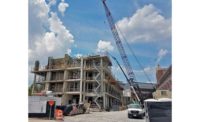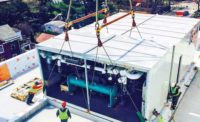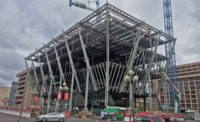The true economic impact of the COVID-19 pandemic on the region’s specialty contractors has unfolded in stark terms. The 24 firms that responded to this year’s ENR MidAtlantic Specialty Contractor survey—which is based on 2020 revenue data in Delaware, Maryland, Pennsylvania, Virginia, West Virginia and the District of Columbia—reported a combined $2.8 billion in revenue, a 28.6% decline from the $3.6 billion reported by the 23 firms ranked last year. And last year’s total represented a 14.3% decrease compared with results from firms ranked in 2019.
The new survey tells a similar story at the top of the chart. The top 10 firms reported a combined $2.3 billion in revenue, a 25.8% drop from last year’s list leaders. The $3.1 billion in revenue recorded by last year’s top 10 represented a 14% decline compared with the $3.6 billion recorded by the 10 largest revenue generators the previous year.
Related link: ENR MidAtlantic 2021 Top Specialty Contractors
The top three firms ranked on this year’s survey are unchanged from last year’s list. No. 1 MasTec Inc.’s $1.4 billion in revenue last year fell sharply to $688 million this year. The firm reported more than $2 billion in revenue on the 2019 ranking.
Ranked No. 2, Comfort Systems USA increased revenue year over year. It logged $380.5 million in regional revenue, up from $357.45 million the prior year, a 6% gain. The firm’s revenue on last year’s ranking dipped nearly 3% from the $367.92 million in regional revenue on the 2019 survey.
The third-ranked firm, Rosendin Electric, made a bigger gain in percentage terms. The company reported $306.34 million in MidAtlantic work in 2020, an 8% increase from the $284.73 million it tallied on the previous year’s survey.
Helix Electric Inc., ENR MidAtlantic Specialty Contractor of the Year, performed $99 million worth of regional work to finish at No. 8 on this year’s ranking. Last year, the firm also ranked No. 8 with $108.5 million in revenue.
Executives from IPC Lydon LLC, ranked No. 23 with $5.30 million in revenue, and Nickle Electrical Cos., No. 16 with $36.70 million in revenue, offered market insights via email. Their responses have been edited for space and clarity.
How do you believe the new infrastructure act will affect construction in the MidAtlantic?
Brandon Leach, chief operating officer at IPC Lydon: Our firm is involved in the energy, transportation and water/wastewater markets. In the MidAtlantic, we think that the infrastructure plan will stimulate construction in these sectors as states will have the ability to utilize federal infrastructure funding for public works projects. A frequent occurrence of past projects in these sectors is that scope is reduced or deferred for budgeting purposes, and we hope the infrastructure bill will ignite a construction boom in the MidAtlantic region.
Jeromy Newton, Nickle Electrical Cos. vice president of operations: It will only add more pressure to an industry that is already dealing with major labor shortages and wage pressure to the likes of which none of us have ever seen before. Plus, the demand for products and lead times will only continue to increase while availability slips.
Which sectors have offered the biggest opportunities in the region?
Leach: Transportation infrastructure, both airports and bridges, have been our biggest opportunities in the region. We predict that growth in these sectors will be exponential in the MidAtlantic over the next several years.
Newton: Senior living and education have offered the biggest opportunities in our area.
Which sectors have cooled?
Leach: While our firm hasn’t experienced cooling in any one particular sector, what we have seen is projects that were in backlog being delayed in response to COVID. We’re slowly starting to see these projects return to the schedule.
What key innovations helped you boost productivity or other metrics in the region?
Leach: Implementation and integration of technology into our projects has been our biggest innovation as a company. In recent years we instituted the use of cloud-based software for safety and issue documentation on our jobsites, allowing for real-time reaction to jobsite hazards, improved communication ... and instant access to analytics from field safety data.
Newton: Nickle has been heavily utilizing BIM to enhance our fabrication efforts.
Do you believe the Omicron variant will have an impact on construction this winter? If so, how is your firm preparing for the variant?
Leach: We believe the impact of the Omicron variant in the winter will be much the same as COVID has been throughout the pandemic. We will have to deal with minor interruptions to labor continuity if a member of the workforce is a close contact or positive case. The protocols, procedures and PPE that we implemented early on in the pandemic have shown to be effective in keeping the impact to a minimum.
Where do you see the industry headed in the next year?
Leach: We forecast that we will see positive and impactful growth in the infrastructure sectors of the MidAtlantic. Supply chain issues being experienced across the industry have had the beneficial side effect of pushing contractors, vendors and owners into a more collaborative approach to projects.
We expect—and hope—for this trend to continue with multiple project stakeholders working toward a common goal.
Newton: There’s plenty of opportunities available for growth, but still not enough skilled tradespeople or product to fulfill them.






Post a comment to this article
Report Abusive Comment